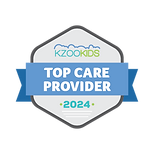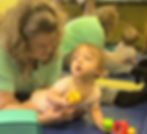

Articulation:
The modeling of sounds correctly during play activities and therapeutic participation helps stimulate skills for articulation development. The level of play is age-appropriate and related to the child’s specific needs. The SLP may show or facilitate the child how to make certain sounds, such as the “r” sound, and may demonstrate how to move the tongue to produce specific sounds.
Oral-Motor:
The SLP uses a variety of oral exercises — including facial massage and various tongue, lip, and jaw exercises — to strengthen the muscles of the mouth. The SLP also may work with different food textures and temperatures to increase a child’s oral awareness during eating and swallowing. This is also aided by intervention with an Occupational Therapist specialized in feeding and oral motor intervention programs.
Who Can Benefit?
-
Social emotional issues
-
Hearing impairments
-
Developmental delays
-
Chronic hoarseness
-
Birth defects – such as cleft lip or cleft palate
-
Autism
-
Motor planning problems
-
Respiratory problems (breathing disorders)
-
Weak oral muscles
-
Excessive drooling
-
Executive functioning challenges/memory struggles
-
Auditory Processing deficits
-
Feeding and swallowing disorders
-
Traumatic brain injury
Physical Therapy
What is Physical Therapy?
The physical therapist provides customized one-on-one care that helps children with developmental, neuromuscular and orthopedic conditions to restore and optimize their development. This allows the infant/child to participate in the highest capacity possible in various areas including their family, community and school-based activities.
Our clinicians utilize therapies in a play-based environment that can help children increase their strength, balance, coordination and motor skills.







